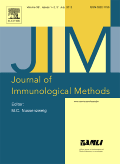
JOURNAL OF IMMUNOLOGICAL METHODS
Scope & Guideline
Unveiling New Horizons in Immunological Methodologies
Introduction
Aims and Scopes
- Immunoassay Development:
The journal consistently publishes research on various types of immunoassays, including ELISA, Lateral flow assays, and multiplex assays, aimed at quantifying antibodies, cytokines, and other immune-related markers. - Flow Cytometry Techniques:
A significant focus is placed on flow cytometry methodologies for immune profiling, including high-dimensional analysis and the development of novel panels for characterizing immune cells. - Antibody Engineering and Characterization:
Research articles often detail the engineering and optimization of monoclonal and polyclonal antibodies, highlighting advances in specificity, affinity, and therapeutic applications. - Immune Response Evaluation:
The journal addresses methodologies for assessing immune responses, including T cell activation, antibody production, and memory cell characterization, particularly in the context of vaccination and disease. - Emerging Technologies in Immunology:
Innovative techniques and tools, such as microfluidics, biosensors, and in silico modeling, are explored to enhance the precision and efficacy of immunological assays.
Trending and Emerging
- COVID-19 Related Research:
With the ongoing pandemic, there has been a surge in studies focused on SARS-CoV-2, including the development of specific assays for antibody detection and the evaluation of immune responses to vaccines. - High-Dimensional Immunophenotyping:
The trend towards detailed immune profiling using high-dimensional flow cytometry and other multiplexing technologies is on the rise, allowing for a more comprehensive understanding of immune cell populations. - Microfluidic and Automated Assays:
Research into microfluidic technologies and automation in immunoassay development is gaining traction, enhancing throughput and reducing the time required for analysis. - Therapeutic Antibody Development:
There is an increasing emphasis on the engineering and optimization of therapeutic antibodies, particularly in the context of cancer immunotherapy and autoimmune diseases. - In Vivo and Ex Vivo Models:
Emerging studies are utilizing in vivo and ex vivo models to better understand immune responses, highlighting a shift towards more clinically relevant research methodologies.
Declining or Waning
- Traditional Serological Techniques:
There is a noticeable decrease in publications focusing on conventional serological methods, such as basic agglutination tests, as more advanced and sensitive assays (like multiplex and automated systems) gain attention. - Basic Immunology Studies:
Research that solely focuses on fundamental immunology concepts without an applied methodology or clinical relevance seems to be less frequent, possibly due to a shift towards translational and clinically relevant research. - Static Assays:
Static methods of analysis, which do not account for dynamic immune responses or real-time monitoring, are becoming less favored as the field moves towards more interactive and responsive assay designs.
Similar Journals
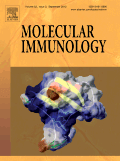
MOLECULAR IMMUNOLOGY
Decoding the Molecular Language of the Immune SystemMOLECULAR IMMUNOLOGY, published by Pergamon-Elsevier Science Ltd in the United Kingdom, is a highly regarded journal in the fields of Immunology and Molecular Biology. With a focus on advancing the understanding of the immune system at the molecular level, the journal has been a critical resource since its inception in 1975. The journal is currently listed in the second quartile (Q2) of its category as per the 2023 rankings, indicating its substantial impact in both Immunology and Molecular Biology research. Researchers and professionals benefit from the journal's rigorous peer-review process and its commitment to publishing high-quality original research, reviews, and methodological studies that explore the intricate dynamics of immune responses. Although it does not currently offer an open access option, MOLECULAR IMMUNOLOGY remains an essential platform for scholars, emphasizing the significance of molecular interactions within the immune system and their implications in health and disease.
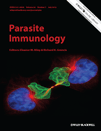
PARASITE IMMUNOLOGY
Unraveling the Mysteries of Parasitic Interactions.PARASITE IMMUNOLOGY, published by Wiley, is a leading journal in the field of immunology and parasitology, with an ISSN of 0141-9838 and E-ISSN of 1365-3024. Since its inception in 1979, it has played a pivotal role in advancing our understanding of host-parasite interactions, immunological responses to parasitic infections, and the mechanisms of immunological resistance. The journal is adeptly positioned within the academic community, currently holding a prestigious Q2 ranking in Parasitology and a Q3 ranking in Immunology for 2023, indicating its significant influence and relevance. Its comprehensive scope attracts a diverse readership, contributing to the discourse surrounding novel therapeutic approaches and emerging challenges in parasitic diseases. With a consistent convergence of research until 2024, PARASITE IMMUNOLOGY is an essential resource for researchers, professionals, and students seeking to deepen their knowledge and foster collaboration in these dynamic fields. Although it is not an open-access journal, the insights shared within its pages are invaluable for shaping future research trajectories.
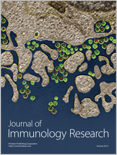
Journal of Immunology Research
Exploring the Frontiers of Immunology: Open Access for AllJournal of Immunology Research, published by HINDAWI LTD, stands as a pivotal open-access journal in the realm of immunology, with a particular emphasis on advancing knowledge in both fundamental and applied aspects of the field. Since its inception in 1990, the journal has committed to the dissemination of high-quality research, earning a respectable impact factor that reflects its significance. Based in Egypt, it provides a platform for researchers from around the world, showcasing innovative studies and reviews that contribute to the understanding of immune system mechanisms. Its 2023 rankings place it in the Q2 category for Immunology and Allergy, and Q1 in the broader category of Medicine (miscellaneous), indicating a strong reputation among its peers. Through its open-access model, the journal promotes wide accessibility of cutting-edge research, catering to researchers, professionals, and students alike. With ambitions that converge through 2024, the Journal of Immunology Research continues to be an essential resource for those seeking to explore the forefront of immunological science.
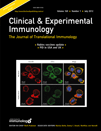
CLINICAL AND EXPERIMENTAL IMMUNOLOGY
Unveiling Breakthroughs in Experimental ImmunologyClinical and Experimental Immunology, published by Oxford University Press, is a premier journal that has been a cornerstone in the field of immunology since its inception in 1966. With an ISSN of 0009-9104 and an E-ISSN of 1365-2249, this journal holds a significant position in academic research, currently ranking in the Q2 category for both Immunology and Allergy (2023). Its impactful contributions are reflected in its Scopus rankings, where it stands at Rank #63 out of 233 in Immunology and Allergy, placing it in the 73rd percentile, and Rank #73 out of 236 in Immunology and Microbiology. Researchers, healthcare professionals, and students will find this journal an invaluable resource for cutting-edge studies, reviews, and clinical advancements in the ever-evolving domain of immunology. While the publication does not offer open-access options, it remains a pivotal platform for disseminating knowledge that impacts both clinical practice and experimental research.
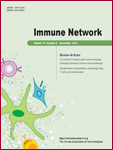
Immune Network
Pioneering Insights in Immune Response and DiseaseImmune Network is a prestigious journal dedicated to disseminating high-quality research in the field of immunology, infectious diseases, and allergy, under the esteemed KOREA ASSOCIATION OF IMMUNOLOGISTS. Founded in 2016, this journal has quickly ascended to a top-tier publication, achieving Q1 rankings in 2023 in multiple relevant categories, including Immunology, Allergy, and Infectious Diseases. With a strong emphasis on innovation and interdisciplinary research, Immune Network appeals to a diverse audience of researchers, professionals, and students keen on advancing the understanding of immune responses and disease mechanisms. However, it is crucial to note that the journal operates under a subscription model without open-access provisions. Its impact factor further solidifies its reputation, reflecting the significant influence of the articles published. Located in South Korea, the journal serves as a global platform for sharing revolutionary insights and fostering collaborations within the immunology community.
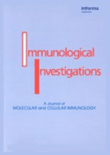
IMMUNOLOGICAL INVESTIGATIONS
Unraveling Complexities in Immune Mechanisms and TreatmentsIMMUNOLOGICAL INVESTIGATIONS, published by Taylor & Francis Inc, is a leading journal in the field of immunology and related medical sciences, with an established presence since 1972. With a focus on cutting-edge research and critical insights in immunological methods and theories, this journal serves as a pivotal platform for researchers, professionals, and students alike. Though it currently holds a Q3 ranking in Immunology and a Q2 ranking in miscellaneous medicine as of 2023, its Scopus rank of #129 out of 236 reflects its dedication to advancing the understanding of immune responses and therapies. The journal's commitment to rigorous peer review and high-quality publications enables it to remain relevant and influential in the ever-evolving landscape of immunological research. Subscription is required to access its extensive archive, which spans critical developments in the field of immunology from 1972 to 2024.
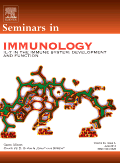
SEMINARS IN IMMUNOLOGY
Shaping the Future of Immunology and AllergySEMINARS IN IMMUNOLOGY, published by Academic Press Ltd - Elsevier Science Ltd, stands as a leading journal in the field of immunology and allergy, with an impressive impact factor that reflects its significant contribution to advancing research and discourse within these vital areas of medical science. Established in 1989, this esteemed journal has garnered a reputation for disseminating high-quality, peer-reviewed articles that span a broad spectrum of immunological topics, making it an essential resource for researchers, healthcare professionals, and students alike. Currently ranked Q1 in both Immunology and Allergy categories, SEMINARS IN IMMUNOLOGY ranks 39th among 233 journals in Immunology and Allergy and 43rd among 236 in Immunology and Microbiology according to Scopus, placing it in the 83rd and 81st percentiles respectively. This underscores its pivotal role in shaping the future of immunological research and clinical practices. While the journal operates under a subscription model with no open access option, it remains committed to providing comprehensive insights and fostering scholarly collaboration within the global immunology community.

JOURNAL OF IMMUNOLOGY
Elevating the Science of ImmunologyWelcome to the JOURNAL OF IMMUNOLOGY, a prestigious publication associated with the American Association of Immunologists and dedicated to advancing the field of immunology. With a rich history dating back to 1945, this journal is renowned for its high-impact research, evident in its notable 2023 Q1 rankings in both Immunology and Allergy, as well as its strong positions in Scopus rankings—Rank #68 in Immunology and Allergy and Rank #79 in Immunology and Microbiology. Although it operates on a subscription basis, its commitment to publishing cutting-edge studies ensures that it remains a vital resource for scientists, healthcare professionals, and students alike. As the journal continues to pave the way for innovative research and breakthroughs in immunological science, it facilitates a platform for dialogue and discovery among researchers and practitioners across the globe.
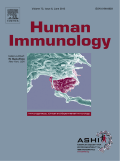
HUMAN IMMUNOLOGY
Navigating the Landscape of Immunological ScienceHUMAN IMMUNOLOGY, published by Elsevier Science Inc, serves as a critical platform for disseminating research in the fields of immunology and allergy, as well as various aspects of miscellaneous medicine since its inception in 1980. With an ISSN of 0198-8859 and E-ISSN 1879-1166, this journal is pivotal for researchers and practitioners looking to advance their understanding of human immune responses and related conditions. The journal currently holds a respectable position within its field, as highlighted by its 2023 Scopus ranks—#114/233 in Immunology and Allergy and #132/236 in Immunology and Microbiology. Moreover, it maintains a Q2 quartile ranking in both Immunology and Allergy and miscellaneous Medicine, underscoring its influence and reach within the scientific community. Although it does not currently offer Open Access options, HUMAN IMMUNOLOGY remains dedicated to providing valuable insights and fostering academic discourse within its discipline, characterized by a rigorous peer-review process and a focus on innovative research trajectories.

OncoImmunology
Pioneering Research at the Intersection of Immunology and OncologyOncoImmunology is a leading peer-reviewed journal published by Taylor & Francis Inc, dedicated to advancing the understanding of the dynamic interplay between the immune system and cancer. Established in 2012 and adopting an open access model since 2020, OncoImmunology provides a platform for high-quality research disseminated globally, with a notable focus on innovative therapies and immunotherapeutic strategies aimed at improving patient outcomes. The journal boasts an impressive impact in the field, holding Q1 rankings in both Immunology and Oncology categories for 2023, and it is recognized within the top-tier journals in its domain, reflected in its Scopus ranks and percentiles. With contributions from leading experts and a wide audience of researchers, clinicians, and advanced students, OncoImmunology not only facilitates scholarly dialogue but also addresses pivotal challenges in cancer treatment, making it an essential resource for those invested in the future of oncological and immunological research.